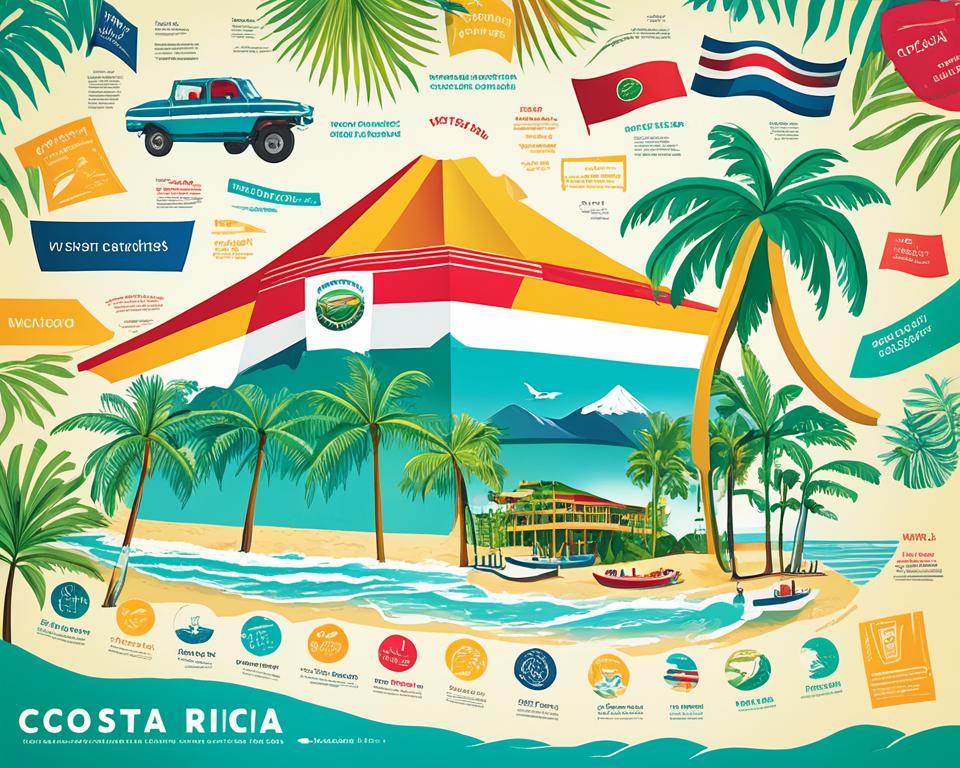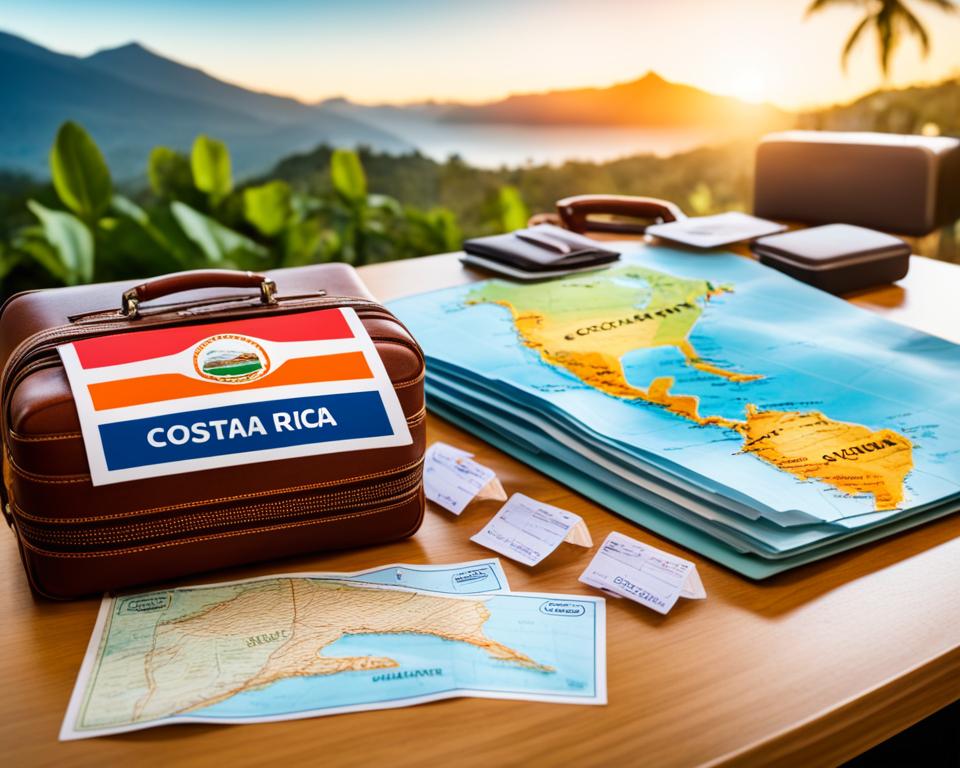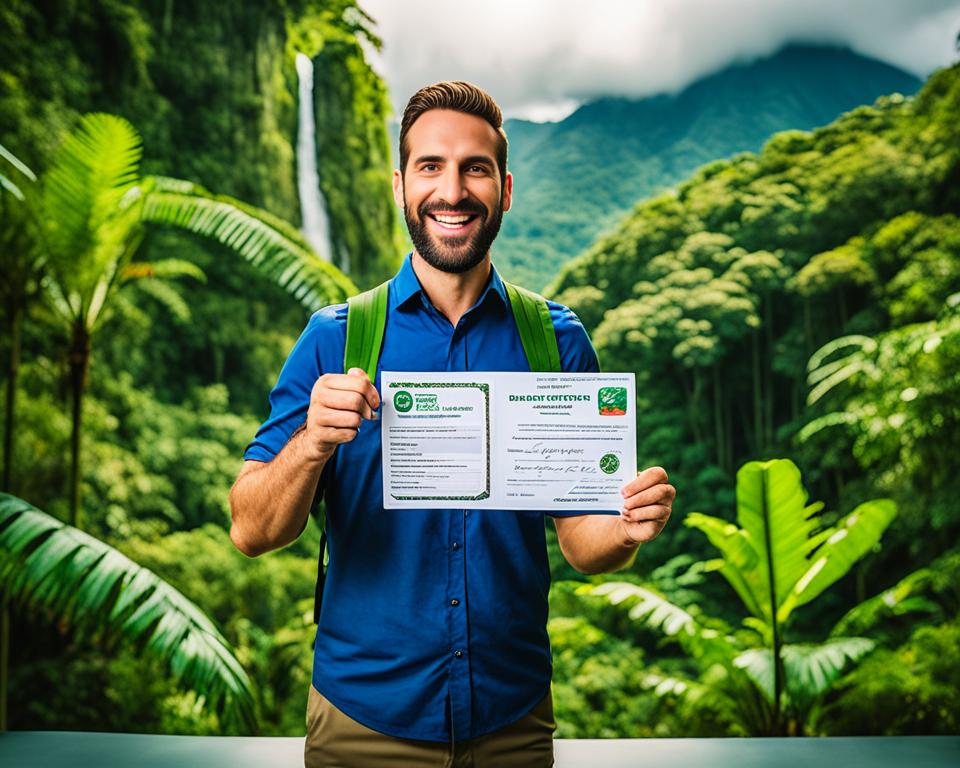As a hub for international workers and service providers, Costa Rica has introduced Law No…

How to Immigrate to Costa Rica: A Comprehensive Guide With CRIE.cr.
Ever thought of living in a tropical paradise? Costa Rica could be that dream come true. This beautiful country is known for its stunning nature and friendly people. However, moving here can feel overwhelming. Luckily, the Costa Rica Immigration Experts (CRIE) are here to help.
CRIE has over 20 years of experience making people’s dreams a reality. They are one of Costa Rica’s most well-respected immigration firms. With their help, moving to this welcoming Central American nation becomes much easier.
So, what’s the big draw to Costa Rica for those looking to make a move?
Let’s check out the amazing benefits waiting for you here.
Key Takeaways
- Costa Rica offers a range of visa options to suit different immigration needs, including retirement, investment, and work opportunities.
- CRIE is a trusted and experienced immigration firm that provides comprehensive guidance throughout the entire relocation process.
- Costa Rica’s warm climate, high quality of life, and affordable cost of living make it a popular destination for expats and retirees.
- The immigration process can be complex, but with the right planning and support from CRIE, you can navigate it successfully.
- Integration into the local community is an important aspect of a successful relocation, and CRIE can help with that as well.
Benefits of Immigrating to Costa Rica
Costa Rica is a top pick for many reasons. It has a warm, sunny climate, a high standard of living, and costs less to live there. This makes it a perfect place if you’re looking for a change or a new start.
Warm and Tropical Climate
Its warm weather and beautiful nature attract lots of people. They choose Costa Rica for its perfect view and peaceful life. The average temperature there is about 80°F (27°C). This is great for those coming from cooler areas.
High Quality of Life
Costa Rica is known for its stable politics and democratic values. It puts a lot into education and taking care of its people. Its strong push for sustainability adds to a great quality of life. Plus, the country offers a rich culture.
Affordable Cost of Living
Living in Costa Rica costs less than in many places. This is good news for retirees or anyone on a budget. Prices for housing, food and healthcare are all lower. This means you can live well without spending too much.

Costa Rica Immigration Requirements
Immigrating to Costa Rica means following its rules. Different types of residency are available, each with specific needs. Pensionado residency is for retirees with a stable pension. For those wanting to invest, there’s an investor option.
After three years, temporary residents can apply for permanent residency. This lets them work without restrictions. After seven years of permanent residency, one can seek Costa Rican citizenship. This offers the chance to vote and travel countrywide freely.
Temporary Residency
This type of residency fits those planning to live in Costa Rica temporarily. It’s great for retirees, students, workers, or investors.
Pensionado
Pensionado residency targets retirees with a monthly pension over $1,000. This visa requires proof of such income.
Investor Residency
The investor path requires a $200,000 investment in a Costa Rican venture. This way, individuals can legally work and operate a business.
Permanent Residency
If you have temporary residency for three years, you can upgrade to permanent. This allows unrestricted work and company ownership.
Citizenship
After seven years of permanent residency, applying for citizenship is possible. This brings the right to vote and move freely across the country. The time needed lowers for some nationalities, and those 65 and older don’t need to take the citizenship test.

| Residency Type | Key Requirements |
|---|---|
| Temporary Residency |
|
| Permanent Residency |
|
| Citizenship |
|
Key Steps in Immigrating to Costa Rica
Moving to Costa Rica has several important steps. First, you need to find a good place to live. This means looking at different areas and thinking about what matters to you, like safety, being close to things you need, and not spending too much. It’s also key to get healthcare coverage and insurance so you can use the country’s medical services.
It’s also important to open a bank account there for your money and everyday needs. If you plan to drive in Costa Rica, you’ll need a local license. This includes written and driving tests.
Finally, making friends and learning the local language is a big help. This can include joining local activities and getting to know people there. It can help you feel more at home in Costa Rica.

These steps are necessary for a good move. They include finding a home, and making sure you have medical and financial basics. Also, getting a driver’s license and connecting with the community are important. All this helps you have a smooth start and enjoy life there as an expat. So, by carefully following these steps, moving to Costa Rica can be a great experience.
How to Immigrate to Costa Rica
Immigrating to Costa Rica means knowing the steps, finding the best residency option, and getting the necessary documents. Costa Rica is a top spot for expats in Central America, and it provides several residency choices for those who want to move there.
Understanding the Process
To start, learn about Costa Rica’s immigration laws. You’ll find different residency permits, like for temporary stays, retirees (pensionados), investors, and those who want to stay permanently or become citizens. Knowing what each one requires helps your application go smoothly.
Choosing the Right Residency Option
After understanding the laws, pick out the best residency option for your situation. Consider your finances, work status, and how long you plan to stay in Costa Rica. It’s crucial to match your needs with the right permit by closely looking at their criteria.
Gathering Required Documents
Getting the right documents is key. You will need to prove your income, show you have health insurance, and have a clear criminal background. Make sure all your paperwork is correct. Costa Rican officials are strict about this part. Any mistakes and your application could be in trouble.
Submitting the Application
Once you have everything ready, it’s time to apply. You can do this on your own or with help from someone who knows the process, like the Costa Rica Immigration Experts (CRIE). They have a good track record of guiding people through Costa Rica’s immigration system. This way, your move can be a smooth success.

Understanding the steps, picking the best residency option, preparing your documents, and applying properly is your first big move to living in Costa Rica.
Working in Costa Rica
If you think about moving to Costa Rica, you need to know the rules about working there. You must get a work permit to work in Costa Rica. There are two types of work permits: one for a set time and another for those who have lived there for three years with a job.
Work Visa Requirements
Getting a work permit in Costa Rica means dealing with their regulations. Make sure you know what documents to bring and how to apply. This will help you transition smoothly into working in Costa Rica.
In-Demand Industries
In Costa Rica, there are many jobs available for people from other countries. Technology, tourism, and healthcare are big there. Teaching English is also a popular choice. You can find job openings on websites like Indeed and LinkedIn. It’s best to have a job lined up before you go.
Employment Opportunities
Costa Rica has laws to protect people who work there. These laws include getting a fair wage, working reasonable hours, and having time off for holidays. By knowing the rules for work permits, you can explore many different job opportunities. You can find jobs that match your skills and goals in Costa Rica.

Cost of Living and Lifestyle in Costa Rica
If you’re thinking about moving to Costa Rica, you’ll find it very appealing because of its low cost of living. International Living says a single person can live well on $1,400 to $1,700 a month. For retired couples, you can have a great life for $2,000 a month. And it gets even better at $2,500 to $3,000.
Housing Costs
In Costa Rica, housing costs change with the location. In a city center, the average rent for a one-bedroom apartment is $485 a month. But outside the city, it drops to $332. If you’re buying, expect to pay around $167.50 per square foot in a city and $124 beyond city limits.
Utility Expenses
Utilities like electricity, water, and internet are not too expensive in Costa Rica. There’s also a plus for those who become legal residents – the monthly Caja healthcare fees. For public healthcare access, residents pay between $50 to $100, depending on their income.
Healthcare Options
Healthcare in Costa Rica is not just accessible, but also affordable. According to International Living, you’d pay about a third to a fifth of US prices. Many foreigners add private insurance to the public system. This private coverage costs between $50 to $200 a month, based on age and what it covers.
Quality of Life
Costa Rica is famous for its happy living and long life expectancy. It’s even been rated the happiest country on earth. Why? A lot of reasons like stable politics, caring for the planet, and friendly people make living here truly great.

Role of Costa Rica Immigration Experts (CRIE)
The Costa Rica Immigration Experts (CRIE) are vital in helping people move through the costa rica immigration process. They have over 20 years of experience and have aided thousands. This makes CRIE one of the leading costa rica immigration lawyers in the nation. Their team guides clients in understanding what’s needed to move, picking the best residency, collecting documents, and handling applications.
Expertise and Experience
CRIE knows costa rican immigration laws and procedures very well. This makes the move to immigrate to costa rica smoother for their clients. They also support new residents in getting used to the neighborhood. This includes helping with housing, setting up bank accounts, and getting a driver’s license.
Services Offered
For those coming to Costa Rica as Investors, Rentistas, or Pensionados, CRIE has the right services. They help with different residency applications in costa rica. However, CRIE cannot speed up or change the way any application is reviewed. All applications are reviewed carefully by officials.
Client Testimonials
CRIE’s clients are very happy with the help they’ve gotten. Testimonials show how well CRIE has guided people in their costa rican immigration journeys. Clients talk about the excellent and professional services CRIE provides.

Integrating into Costa Rican Culture
Getting to know the local Costa Rican community is key for a happy life there. As someone who has moved from another country (living in costa rica as an expat), it’s crucial to learn and love the local ways. This means getting familiar with customs, traditions, and daily life in Costa Rica.
Learning Spanish
Speaking Spanish is very important for daily life in learning spanish for costa rica. It helps us communicate better and understand the culture. Taking Spanish classes or talking with native speakers can make a big difference. It helps us in daily life and to make real connections with Costa Ricans.
Embracing Local Customs
Joining in with Costa Rican customs helps us feel welcome and like we belong. This means taking part in community activities and trying out local dishes. It also means living the “pura vida” way, which shows the country’s laid-back and happy spirit. Moving to Costa Rica opens our eyes to a joyful and welcoming culture.
Connecting with Expat Communities
Getting involved with expat groups offers support and friendship. These connections can make the big move easier. Costa rica expat life becomes more comfortable with friends who share experiences and advice.
We should try to learn and be part of local life. This is the best way to enjoy the beauty of Costa Rica.

Conclusion
Moving to Costa Rica can truly change your life. You get to enjoy the warm weather and high quality of life at a low cost. But, getting there is not simple. It’s important to know the country’s rules and procedures. By teaming up with experts like the Costa Rica Immigration Experts (CRIE), your path to residency becomes clear.
CRIE offers knowledge, advice, and support the whole way through. They make your move a success. Whether for an adventure, to relax, or to retire comfortably, Costa Rica is a top choice. With proper prep and help, you can live your dream in this stunning country.
Costa Rica has different visas for various situations. From the Pensionado for retirees to the Investor visa, there’s something for everyone. By meeting the immigration rules, preparing the needed paperwork, and applying, you open the door to this friendly, peaceful place.
As you start your journey to Costa Rica, rely on CRIE’s expertise. They know the immigration laws well. This lets you focus on enjoying the famous ‘pura vida’ and becoming part of the lively community.
FAQ
What are the different types of residency options available in Costa Rica?
Costa Rica has temporary, retirement, investor, permanent, and citizenship residency. These options cater to different needs.
What are the requirements for obtaining temporary residency in Costa Rica?
For temporary residency, you need a steady income and health insurance. Specific criteria for the residency type must be met, like for retirees or investors.
How can I apply for permanent residency in Costa Rica?
To get permanent residency, you first need a temporary permit for three years. You must show you worked or invested consistently in the country.
What are the steps involved in the Costa Rica immigration process?
First, you need to understand immigration requirements. Then, pick the best residency option. After that, collect your documents and apply, alone or with help.It’s wise to get advice from an immigration specialist.
Do I need a work permit to work in Costa Rica?
Working in Costa Rica means needing a work permit. The type depends on your residency and work background.
What is the cost of living like in Costa Rica?
Costa Rica’s cost of living is lower than many expat spots. You’ll find affordable housing, utilities, and a great healthcare system. This makes life comfortable and enjoyable for many.
How can the Costa Rica Immigration Experts (CRIE) assist with the immigration process?
CRIE helps with every step, from understanding requirements to settling newcomers in the local community. They offer guidance on the best path and handle the paperwork for you.
How important is it to learn Spanish when moving to Costa Rica?
Knowing Spanish is key for living in Costa Rica. It makes communication easier and opens the door to the culture. It also helps in making friends, whether with locals or other expats. Learning the customs and connecting with people is a great way to start a new life in Costa Rica.
Source Links
- https://crie.cr/how-to-immigrate-to-costa-rica-2/
- https://crie.cr/guide-to-immigrating-to-costa-rica/
- https://crie.cr/immigrate-to-costa-rica/
- https://aglegal.com/inmigration-law/6-new-reasons-to-be-a-resident-in-costa-rica/
- https://crie.cr/permanent-residency-in-costa-rica/
- https://crie.cr/citizenship-in-costa-rica/
- http://www.costarica-embassy.org/index.php?q=node/147
- https://visaguide.world/moving-to/costa-rica/
- https://crie.cr/residency-requirements-in-coste-rica/
- http://www.costarica-embassy.org/index.php?q=node/148
- https://crie.cr/digital-nomad-visa-in-costa-rica/
- https://crie.cr/work-permit-in-costa-rica/
- https://costa-rica-guide.com/living/working/working-in-costa-rica/
- https://www.moving.com/tips/your-guide-to-moving-to-costa-rica/
- https://crie.cr/cost-of-living-in-costa-rica-2/
- https://internationalliving.com/countries/costa-rica/cost-of-living-in-costa-rica/
- https://crie.cr/costa-rica-immigration-expert-services-overview/
- https://crie.cr/frequently-asked-questions/
- https://crie.cr/about-crie/
- https://gap.cr/residency-in-costa-rica/
- https://www.gaprealestate.com/how-to-get-residency-in-costa-rica/
- https://crie.cr/integration-of-immigrants-in-costa-rica/
- https://crie.cr/cultural-adaptation-tips-for-costa-rica-immigrants/
- https://crie.cr/immigrate-to-costa-rica-with-us/


